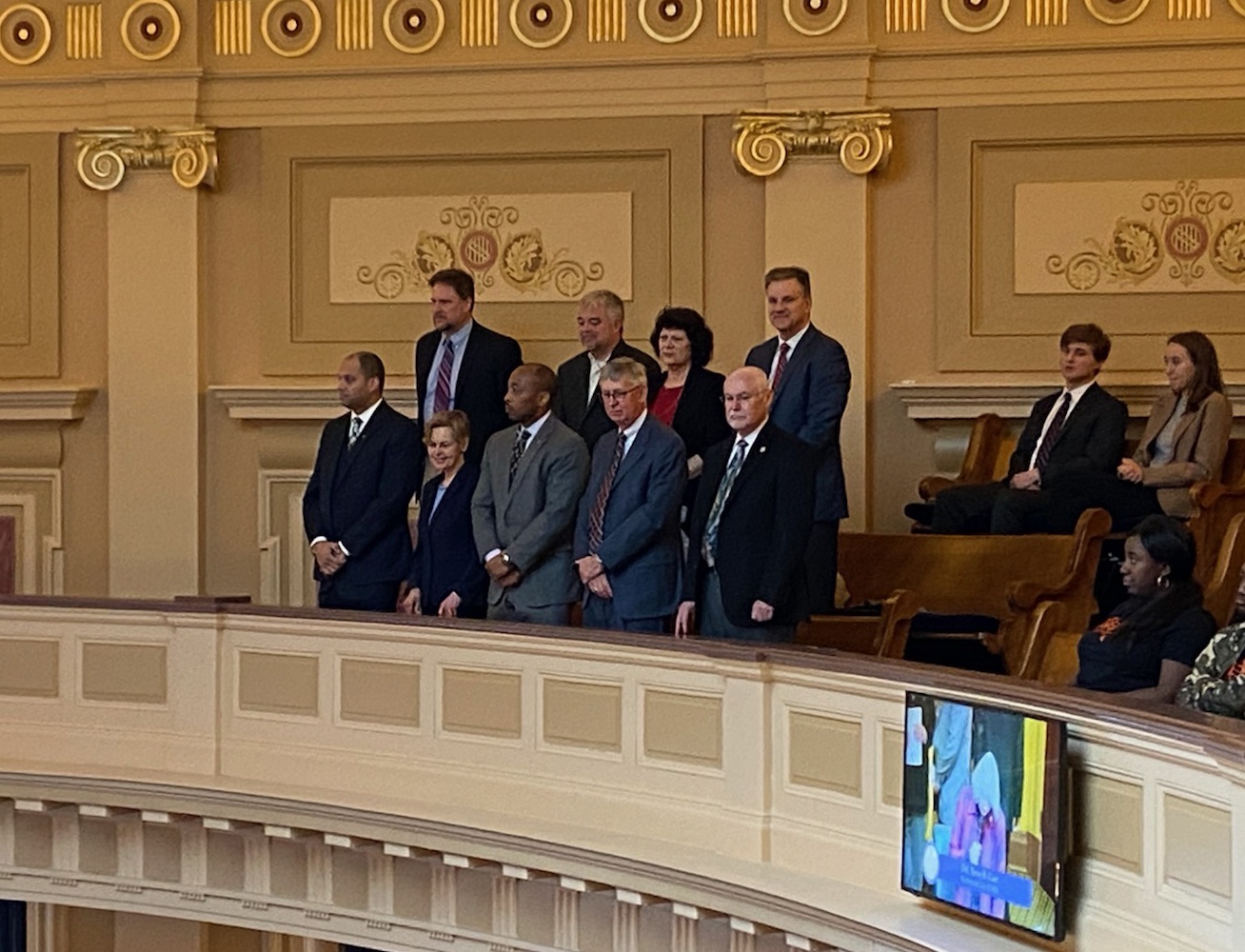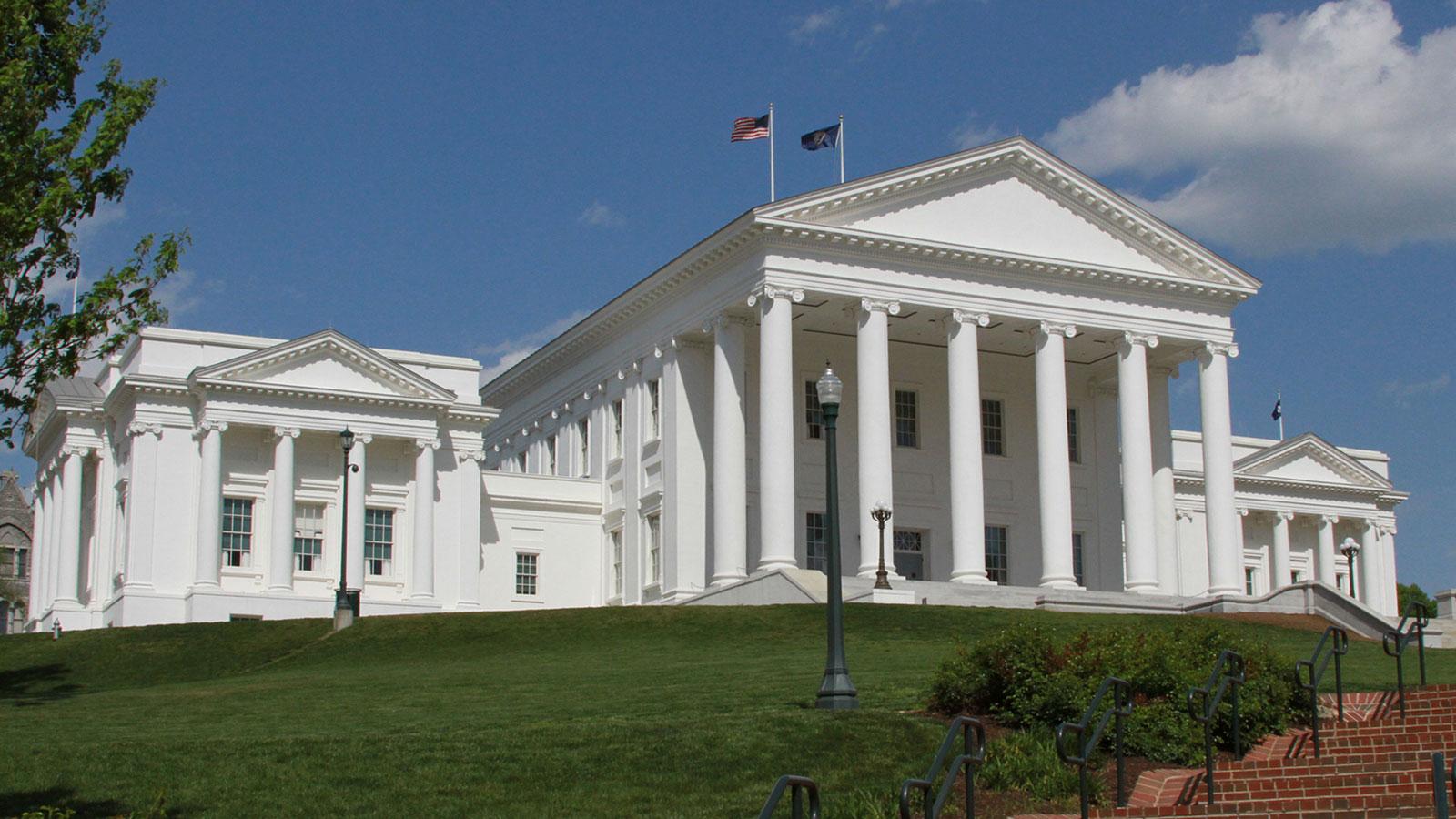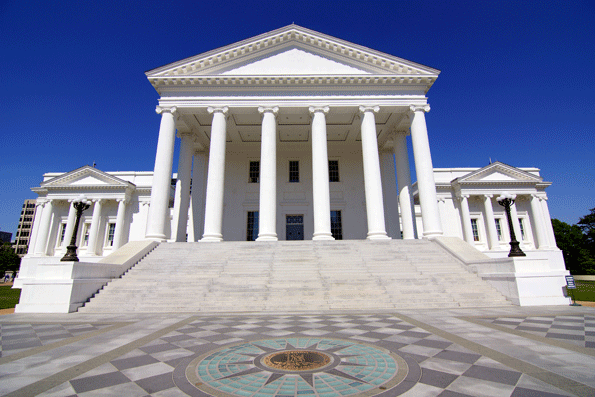We have just reached the halfway marker of the General Assembly. The “Crossover” date of February 15 occurred this week which was the last day for the House and Senate to act on its own legislation. If a bill did not get a hearing before this date, it automatically dies.
Please find below the bills that AIA Virginia is tracking “Actively” and “Monitoring”. The bills of interest that did not pass this year are listed under the “Dead” category.
ACTIVE
These bills are being actively lobbied by Williams Mullen, AIA Virginia, and ACEC Virginia. This does not necessarily mean we are testifying before committees on all of these bills. It could mean that we are engaged in conversations with bill patrons or other industries that can alter the legislation’s outcome.
HB 282 – Coyner – Criminal records; effect of criminal convictions on licensure, data to be included in report.
HB 429 – Bulova – Virginia Public Procurement Act; architectural and professional engineering term contracting. [AIA/ACEC Bill – Passed House 99-0]
HB 816 – Torian – Va. Public Procurement Act; any bid or offer under Act to identify all subcontractors.
HB 881 – Fowler – Contracts; payment clauses to be included, right to payment of subcontractors.
SB 225 – McPike – Virginia Public Procurement Act; architectural and professional engineering term contracting. [AIA/ACEC Bill – Passed Senate 38-0]
SB 290 – Favola – State agencies and localities; solar-ready roof requirements, etc.
MONITOR
AIA Virginia is watching bills placed in this category. Often, we are watching bills because they are of interest and we want to remain informed. When this is the case, it is often another organization taking the lead due to its specific expertise and political relationships. If amendments are introduced that make a bill in this category detrimental to our profession, then it is moved to the ACTIVE list and we engage. There are some bills that AIA Virginia does not take a position on. An example of this would be bills that define “small business”. Because of the composition of our membership, we would not want to take an action that would hurt any of our members.
HB 5 – Morefield – Flood Relief Fund; established.
HB 19 – Fowler – Virginia Public Procurement Act; public higher educational institutions, disclosure by offerors.
HB 73 – Ware – Electric utilities; definitions, aggregate capacity requirements for renewable energy facilities.
HB 74 – Ware – Va. Clean Economy Act; non-bypassable charges, energy-intensive trade-exposed (EITE) industries
HB 101 – Head – Group health benefit plans; sponsoring associations, formation of benefits consortium. (Similar bills: HB 245, HB 884, HB 1169 )
HB 208 – Webert – Regulatory Innovation, Department of and Virginia Regulatory Sandbox Program; created, report.
HB 221 – Davis – STEM+C; included in Standards of Learning.
HB 244 – Webert – Regulatory Budget Program; DPB to establish a continuous Program, report.
HB 282 – Coyner – Criminal records; effect of criminal convictions on licensure, data to be included in report.
HB 332 – Head – Income tax, state and corporate; credit for small businesses.
HB 474 – Brewer – Automatic fire sprinkler inspectors; certification, exempts building officials and fire officials.
HB 516 – Bulova – Flood resiliency & protection; implements recom. from first Va. Coastal Resilience Master Plan.
HB 517 – Bulova – Chief Resilience Officer; clarifies designation and role.
HB 563 – O’Quinn – School Construction Matching Grant Fund and Program; established, funding sources.
HB 741 – Bell – Annual public elementary and secondary school safety audits; creation or review of school building.
HB 818 – Torian – Virginia Public Procurement Act; prompt payment of bills by state agencies, etc.
HB 820 – Torian – Small Business and Supplier Diversity, Department of; disparity study.
HB 847 – Bloxom – Coastal Virginia Resiliency Authority; established, report.
HB 903 – Lopez – Virginia Green Infrastructure Bank; created.
HB 1006 – Brewer – Income tax, state and corporate; deductions for business interest.
HB 1161 – McGuire – Virginia Public Procurement Act; required contract provisions, prohibition.
HB 1210 – Hope – Historic preservation; filing of a historic designation application.
HB 1225 – Bulova – Energy performance-based contracts; roof replacement.
HB 1287 – Runion – Virginia Public Procurement Act; preference for recycled materials.
HB 1289 – Head – Uniform Statewide Building Code; exemption for certain use and occupancy classifications.
HB 1301 – Kilgore – Clean Energy and Community Flood Preparedness Act; repeals Act.
HB 1309 – Bulova – Resilient Virginia Revolving Loan Fund.
HB 1310 – Shin – Virginia Public Procurement Act; moderate-risk contracts; federal General Services Administration.
HB 1325 – Reid – Local governments; additional powers, Commercial Property Assessed Clean Energy financing programs.
HJ 16 – Hodges – Coastal Flooding, Joint Subcommittee studying; continued, appropriation.
SB 94 – Howell – Internal Revenue Code; conformity of the Commonwealth’s taxation system.
SB 117 – Newman – Local school divisions; budget bill to include appropriation of surplus for operational costs.
SB 121 – Hackworth – Contractors; exemption from licensure for work providing remodeling, etc., valued at $25,000, etc.
SB 153 – Locke – Diversity, Equity, and Inclusion, Secretary of; created.
SB 195 – Mason – Group health benefit plans; bona fide associations, formation of benefits consortium. [Similar bill: SB 549]
SB 210 – Petersen – Virginia Public Procurement Act; public higher educational institutions, disclosure by offerors.
SB 276 – Stanley – School boards; unexpended local funds for capital projects.
SB 288 – Ebbin – Income tax, state and corporate; deduction for business interest disallowed.
SB 400 – Hanger – Agritourism event buildings; authorizes the BHCD to promulgate regulations related to buildings.
SB 409 – Morrissey – Criminal convictions; effect on licensure, date to be included in biennial report.
SB 471 – McClellan – Literary Fund; open application process for loans, maximum loan amounts, etc.
SB 472 – McClellan – Retail sales & use tax, additional local; use of revenues for construction or renovation of schools.
SB 473 – McClellan – School Construction Fund and Program; created and established.
SB 481 – McClellan – School boards and local governing bodies; unexpended local funds, etc.
SB 550 – Bell – Virginia Public Procurement Act; payment clauses to be included in contracts; right to payment.
SB 551 – Marsden – Flood resiliency & protection; implements recom. from first Va. Coastal Resilience Master Plan.
SB 732 – Lewis – Climate resilience; locality’s comprehensive plan to consider strategies to address.
DEAD
The following depicts the bills of interest to AIA Virginia that were introduced but were not successful. This list is expected to grow as the General Assembly advances.
HB 12 – Anderson – Public school buildings; limits entry points, screening individuals.
HB 119 – March – Public-Private Competition Act; created, repeals Competitive Government Act, etc.
HB 251 – Simonds – School boards and local governing bodies; unexpended local funds, etc.
HB 252 – Simonds – School division maintenance reserve tool; Department of Education to develop or adopt and maintain.
HB 253 – Simonds – Literary Fund; open application process for loans, maximum loan amounts, etc.
HB 254 – Simonds – School Construction Fund and Program; created and established.
HB 273 – McNamara – Income tax, state; subtractions and deductions related to Paycheck Protection Program loans.
HB 295 – McNamara – Income tax, corporate; reduces tax from its current rate.
HB 352 – Watts – Income tax, state and corporate; business interest.
HB 364 – Willett – Regional planning; climate resilience to be included as part of strategic plans.
HB 374 – Williams Graves – Virginia Public Procurement Act; construction contracts, requirement to submit list.
HB 379 – Sullivan – Energy benchmarking; access to data on energy usage in certain buildings, civil penalty.
HB 471 – Subramanyam – State agencies and localities; solar-ready roof requirements, etc.
HB 531 – Hudson – Sales and use tax, additional local; revenues to support construction or renovation of schools.
HB 602 – Hayes – Flood Control, Department of, and Commonwealth Flood Plan; created, report.
HB 608 – Bourne – School boards; unexpended local funds for capital projects.
HB 701 – Kory – Uniform Statewide Building Code; local building codes and regulations, etc.
HB 707 – Keam – Transportation funding; statewide prioritization process, resiliency.
HB 757 – Krizek – Employment; anti-harassment training requirement.
HB 905 – Lopez – Energy efficiency standards; more stringent energy efficiency requirements.
HB 966 – Subramanyam – Va. Public Procurement Act; executive branch agencies’ goals for participation by small businesses.
HB 967 – Subramanyam – General Services, Department of; point-based program for prime contractors.
HB 998 – Kory – Building energy use intensity; reporting, reduction, requirements, incentive programs.
HB 999 – Maldonado – New structures; construction evaluation of impact of types of electricity.
HB 1099 – LaRock – Retail sales & use tax, additional local; use of revenues for construction or renovation of schools.
HB 1100 – LaRock – Public elementary and secondary school buildings; standards for maintenance, operations, etc.
HB 1219 – Lopez – Historic rehabilitation tax credit.
HB 1253 – Fowler – Department of Professional and Occupational Regulation; licensure by apprenticeship.
SB 15 – Favola – Insurance; paid family leave.
SB 239 – Hashmi – STEM+C; included in Standards of Learning.
SB 452 – Boysko – Local governments; additional powers, energy efficiency of buildings.
SB 532 – Stuart – Clean Energy and Community Flood Preparedness Act; repeals Act.
SB 540 – Peake – Income tax, state and corporate; credit for small businesses.
SB 569 – Kiggans – Coastal Virginia Resiliency Authority; established.
SB 603 – Stanley – Public elementary and secondary school buildings; standards for maintenance, operations, etc.
SB 734 – Ruff – Va. Public Procurement Act; population thresholds for architectural & prof. engineering contracting.
SB 747 – McDougle – Uniform Statewide Building Code; religious exemptions.
If you have any questions, please feel free to submit them to Corey Clayborne, FAIA at cclayborne@aiava.org



